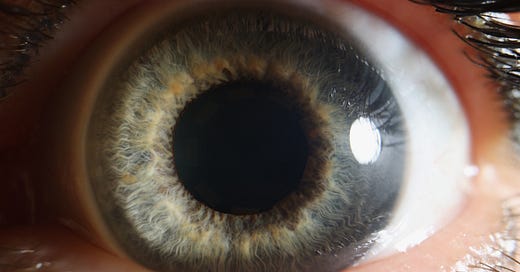Atropine and the 'beautiful lady'
The deadly nightshade holds a fascinating place in legend, lore, and modern medicine.
Atropine is a naturally occurring alkaloid initially extracted from the deadly nightshade plant. The plant’s genus name, Atropos, refers to Atropos, the ancient Greek fate (the intractable one) who cuts the thread of life, representing the inevitability of death.
The plant's species name, belladonna, stems from its ocular application by women in Renaissance Italy to dilate their pupils—a trait then regarded as a sign of beauty, with "belladonna" translating to "beautiful lady." This property of atropine, which blocks the action of acetylcholine on muscarinic receptors in the eye, led to its early inclusion in the formulary of ophthalmic drugs.
The painting "Woman with a Mirror," created by the Renaissance artist Titian, is displayed in the Louvre Museum in Paris. It depicts a young, beautiful Venetian "belladonna" who might have used drops of the nightshade berry juice to dilate her pupils, thereby enhancing their beauty.

The Deadly Nightshade
The deadly nightshade is rich in a class of pharmacologically active compounds known as the tropane alkaloids. Atropine itself is actually a racemic mixture of (+) and (-) isomers of hyoscyamine. It is considered to be an anticholinergic drug. Anticholinergic agents are substances that inhibit the action of the neurotransmitter acetylcholine at synapses within the central and peripheral nervous systems. They suppress the parasympathetic nervous system by selectively preventing acetylcholine from binding to its receptors on nerve cells.
Medicinal Uses of Atropine Today
In modern medicine, atropine is important for the management of various conditions. Atropine is commonly administered to diminish saliva and mucus production in the respiratory passages during surgical procedures. It is also used as an antidote for certain types of poisons, specifically those from exposure to insecticides and certain poisonous mushrooms. In urgent care, atropine is a vital medication for correcting bradycardia, a condition characterized by a slower than normal heartbeat. In ophthalmology, atropine is used to dilate the pupils in the diagnosis and treatment of certain eye diseases.
Here is a summary of some of the most common applications:
For Excessive Saliva:
Helps dry up saliva, usually not the go-to for patients on ventilators but can be used if needed.
Another drug, Glycopyrrolate, is stronger for drying up saliva.
For Poisoning from Pesticides or Certain Mushrooms:
Works against the harmful effects of some poisons.
Can be given through an IV for excessive drooling, mucus in the lungs, or a very slow heartbeat.
For Very Slow Heartbeat:
The go-to treatment if someone's heart is beating too slowly without a clear reversible cause.
Necessary if the slow heartbeat is due to a problem in the heart's electrical pathways below the nodes or if it causes signs of poor blood circulation.
Before Putting a Tube in the Windpipe:
Sometimes used before this procedure to prevent a slow heartbeat, though it's not standard.
If the heartbeat slows down a lot after the tube is placed, especially in kids, atropine can help.
For Diarrhea:
Used in a combination medication as a backup option to slow down the bowels.
For Heart Emergency Protocols:
Recommended for cases where the heart beats too slowly and causes symptoms.
No longer advised for patients without a heartbeat.
The Takeaway
The deadly nightshade has a fascinating history as a poison, cosmetic agent, and now the source of a life-saving medicine! It is just one of many plants that have helped to shape modern medicine as we know it today.
Yours in health, Dr. Quave
Cassandra L. Quave, Ph.D. is a scientist, author, speaker, podcast host, wife, mother, explorer, and professor at Emory University School of Medicine. She teaches college courses and leads a group of research scientists studying medicinal plants to find new life-saving drugs from nature. She hosts the Foodie Pharmacology podcast and writes the Nature’s Pharmacy newsletter to share the science behind natural medicines. To support her effort, consider a paid or founding subscription, with founding members receiving an autographed 1st edition hardcover copy of her book, The Plant Hunter.
Available in hardcover, paperback, audio, and e-book formats!








